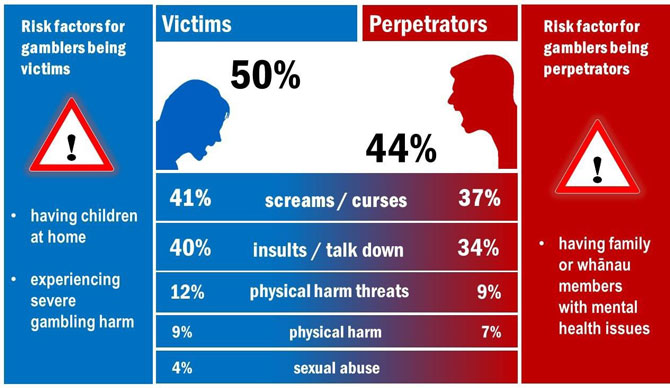
Summary
Four hundred and fifty-four clients of problem gambling treatment services took part in a short survey on gambling and family/whānau violence and abuse. There were 370 gamblers and 84 affected others (eg, partners, other family members and friends). The survey took place from June 2013 to March 2015.
The purpose of the research was to identify the level of family/whānau violence and abuse in people seeking help for problem gambling, and to increase our understanding of these issues. A wide definition of family/whānau violence was used, which included physical violence and coercive control (most often thought of as violence), as well as psychological and emotional abuse (more often thought of as conflict), and sexual abuse.
Family violence risk factors for gamblers

Overall, half (50%) of the participants were victims of physical, psychological, emotional, verbal or sexual abuse in the past 12 months. Slightly less than half (44%) of the participants committed violence or abuse at least once in the past 12 months. Note that the frequency of the violence (how often it occurred in the past 12 months) was not captured.
The most common abuse was verbal:
- 37% ‘screamed or cursed at’ another person and 41% were victims of this
- 34% ‘insulted or talked down to’ another person and 40% were victims of this.
Physical abuse was less common:
- 7% caused physical harm and 9% were victims of physical harm
- 9% threatened physical harm and 12% were threatened with physical harm.
No participants reported sexually abusing someone but 4% had been sexually abused.
More affected others reported committing and being victims of violence and abuse than gamblers:
- 57% of affected others committed violence/abuse compared with 41% of gamblers
- 66% of affected others were victims of violence/abuse compared with 47% of gamblers.
About three-quarters of the family/whānau violence and abuse was to, or from, a current or ex- partner; the other family members were sons or daughters, and other family/whānau members.
Of the 454 participants, 208 (166 gamblers, 42 affected others) agreed to take part in a second, more detailed survey with a researcher. Results from this second survey indicated that affected others were more likely to think that the violence/abuse was caused by the gambler’s gambling, compared with gamblers:
- 46% of affected other victims thought this compared with 21% of gambler victims
- 54% of affected other perpetrators thought this compared with 33% of gambler perpetrators.
Gamblers were more likely to commit financial abuse; affected others were more likely to be victims of financial abuse. Financial abuse related to being concerned about money, valuables or property going missing; having money taken from a purse/wallet or bank account without permission; being asked or forced to sign papers about money; or being forced to gamble for another person.
Major risk factors for gamblers being victims of family/whānau violence or abuse were having children living at home, and experiencing some of the greatest negative effects from problem gambling.
The major risk factor for gamblers committing family/whānau violence or abuse was having family/whānau members with a mental health issue.
Gamblers underestimated the negative effects of their gambling on family/whānau members, children and home life, which included financial problems, reduced quality of relationships, relationship strain and break-up, negative health effects, negative emotions, social deprivation and neglect.
Family/whānau members used various strategies to cope with the other person’s gambling, which included becoming emotional with the gambler, explaining their feelings to the gambler, helping the gambler to sort out financial problems, pretending that everything was fine, and putting the interests of other family/whānau members ahead of the gambler.
This research has shown that family/whānau violence and abuse is common in people seeking help for their own or for someone else’s gambling. The research also showed that the short screen used in the study (which is called the HITS scale) is simple and practical to use by people who are not family violence experts. If this simple screening tool were to be used together with existing procedures to identify family violence amongst people who are affected by gambling problems, this could improve the outcomes for those people. However, before such processes are put into place, appropriate training would be required for staff on how to screen for, and to assess risk of, family/whānau violence and abuse, as well as to make sure that support mechanisms and safety processes are in place for people who disclose violence and serious risk to themselves or others.
The research was conducted by Auckland University of Technology, Gambling and Addictions Research Centre and Interdisciplinary Trauma Research Centre in association with three national problem gambling treatment providers. Three family violence organisations provided advice to the research team and assisted in supporting safe research processes and referrals for participants. The study was funded by the Ministry of Health. The research team comprised Dr Maria Bellringer, Katie Palmer du Preez, Janet Pearson, Dr Nick Garrett, Dr Jane Koziol- McLain, Dr Denise Wilson and Dr Max Abbott.
